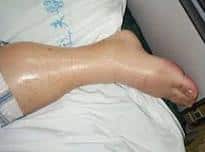The Greek word oídēma came to scientific Latin as oedema , which in our language became edema . The term is used in the field of medicine to refer to the inflammation caused by the presence of a fluid in cellular tissue .
 Edema is a flaccid swelling : when pressure is applied to it, it collapses. The concept is associated with dropsy , which is the accumulation or dispersion of serous fluid.
Edema is a flaccid swelling : when pressure is applied to it, it collapses. The concept is associated with dropsy , which is the accumulation or dispersion of serous fluid.
Considered a clinical sign , edema can be caused by multiple reasons: an increase in the permeability of the vessel walls, an increase in hydrostatic pressure, an alteration in the fluid retention of the tissues and a drop in blood osmotic pressure are possible reasons for its appearance.
Edema can be localized or generalized, and can be hot or cold . Once it appears, it requires frequent supervision by a medical professional, who should indicate the steps to follow.
There are multiple types of edema. Pulmonary edema , for example, occurs when there is an atypical accumulation of fluids in the lungs , which swell and cause respiratory complications.
Pulmonary edema is usually caused by heart failure. The pressure in the arteries leading to the lungs increases due to poor heart function, causing fluid to leak into the alveoli. This, in turn, prevents oxygen from circulating normally through the lungs.
When we talk about edema that appears in the legs, ankles or feet, we must take into account that there may be many causes for it. However, among the most significant are standing for long periods of time or sitting for long periods of time in hot weather, being overweight, excessive salt consumption, sunburn, kidney disease, expecting a baby, etc.
However, edema can also occur when taking certain blood pressure medications or even anti-inflammatory drugs.
To prevent leg edema, it is necessary not to spend too much time in the same position, reduce salt intake in the diet, do physical exercise that stimulates the pumping of the lower limbs, sleep with the legs slightly elevated and avoid clothing that is too tight and can put excessive pressure on them. It is also necessary to massage the legs daily and, when showering, alternate cold and hot water.
It is important that edema is treated immediately because if not, it can lead to adverse consequences and complications such as difficulty walking, risk of infection in the area affected by the swelling, reduced blood circulation in that area and even reduced elasticity in the veins, arteries and even in the muscles.
Other edemas that can occur in humans are cerebral edema (which occurs in the brain), macular edema (eye) and angioedema (mucous membranes and skin).
